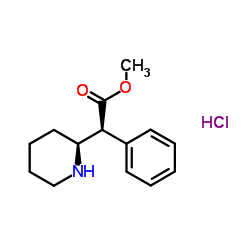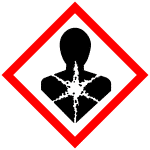methylphenidate hydrochloride

methylphenidate hydrochloride structure
|
Common Name | methylphenidate hydrochloride | ||
|---|---|---|---|---|
| CAS Number | 298-59-9 | Molecular Weight | 269.767 | |
| Density | N/A | Boiling Point | 327.6ºC at 760 mmHg | |
| Molecular Formula | C14H20ClNO2 | Melting Point | 224 - 226ºC | |
| MSDS | Chinese USA | Flash Point | 152ºC | |
| Symbol |


GHS07, GHS08 |
Signal Word | Danger | |
|
Alterations in brain neurotrophic and glial factors following early age chronic methylphenidate and cocaine administration.
Behav. Brain Res. 282 , 125-32, (2015) Attention deficit hyperactivity disorder (ADHD) overdiagnosis and a pharmacological attempt to increase cognitive performance, are the major causes for the frequent (ab)use of psychostimulants in non-ADHD individuals. Methylphenidate is a non-addictive psycho... |
|
|
Methylphenidate Increases Glutamate Uptake in Bergmann Glial Cells.
Neurochem. Res. 40 , 2317-24, (2015) Glutamate, the main excitatory transmitter in the vertebrate brain, exerts its actions through the activation of specific membrane receptors present in neurons and glial cells. Over-stimulation of glutamate receptors results in neuronal death, phenomena known... |
|
|
Behavioral and neuronal recording of the nucleus accumbens in adolescent rats following acute and repetitive exposure to methylphenidate.
J. Neurophysiol. 113(1) , 369-79, (2015) The nucleus accumbens (NAc) has been shown to play a key role in the brain's response to methylphenidate (MPD). The present study focuses on neuronal recording from this structure. The study postulates that repetitive exposure to the same dose of MPD will eli... |
|
|
Differential substitution for the discriminative stimulus effects of 3,4-methylenedioxymethamphetamine and methylphenidate in rats.
J. Pharmacol. Exp. Ther. 350(2) , 403-11, (2014) Previous studies have demonstrated that methylphenidate, MDMA (3,4-methylenedioxymethamphetamine), and other psychostimulants exert stimulant-like subjective effects in humans. Furthermore, MDMA and methylphenidate substitute for the discriminative stimulus e... |
|
|
Psychopharmacological treatment in children and adolescents with autism spectrum disorders in Germany.
Res. Dev. Disabil. 34(9) , 2551-63, (2013) Data on psychopharmacological treatment of individuals with autism spectrum disorder (ASD) are scarce, especially for European countries. This study evaluated psychopharmacotherapy utilisation in children and adolescents with a diagnosis of ASD in Germany. Da... |
|
|
Biased reporting of results in patients at ultra-high risk of psychosis.
J. Clin. Psychiatry 74(11) , 1123, (2013)
|
|
|
Methylphenidate and atomoxetine inhibit social play behavior through prefrontal and subcortical limbic mechanisms in rats.
J. Neurosci. 35(1) , 161-9, (2015) Positive social interactions during the juvenile and adolescent phases of life, in the form of social play behavior, are important for social and cognitive development. However, the neural mechanisms of social play behavior remain incompletely understood. We ... |
|
|
Effects of chronic methylphenidate on cocaine self-administration under a progressive-ratio schedule of reinforcement in rhesus monkeys.
J. Pharmacol. Exp. Ther. 345(3) , 374-82, (2013) It has been hypothesized that drugs that serve as substrates for dopamine (DA) and norepinephrine (NE) transporters may be more suitable medications for cocaine dependence than drugs that inhibit DA and NE uptake by binding to transporters. Previous studies h... |
|
|
Developing interventions for cancer-related cognitive dysfunction in childhood cancer survivors.
J. Natl. Cancer Inst. 106(8) , doi:10.1093/jnci/dju186, (2014) Survivors of childhood cancer frequently experience cancer-related cognitive dysfunction, commonly months to years after treatment for pediatric brain tumors, acute lymphoblastic leukemia (ALL), or tumors involving the head and neck. Risk factors for cancer-r... |
|
|
Clinical practice. Attention deficit-hyperactivity disorder in children and adolescents.
N. Engl. J. Med. 370(9) , 838-46, (2014)
|